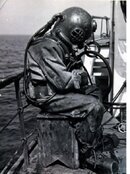Andy, check out
HSA Non-Members
It depends on the agency. A quadriplegic will NOT be swimming on their own.
Agreed. But this thread was started on the basis of discussing the PADI swim test. I was merely referencing PADI's outlook. To date, PADI doesn't have any formal disabled diving program.
To attempt instruction to disabled people will, in many circumstances, require instructor training that far exceeds the minimum provisions given to PADI instructors on an IDC.
Likewise, a scuba certification awarded to a handicapped person, would requires special stipulations that are not covered by the auspices of a standard 'Open Water Diver' certification. Specifically, the need to dive with a suitably educated/trained assistant; thereby ensuring that divers' safety through effective support for their disability. In short, they wouldn't necessarily be 'qualified' to turn up alone at a dive charter, get paired with an insta-buddy and jump in for a dive without supervision - which is what the OW certification provides.
PADI does have the 'Junior' diver certification levels, and these give examples of special stipulations attached to courses/certifications. It wouldn't be hard to create similar provisions for the handicapped, but PADI have chosen not to address that (yet). I guess it's a matter of demand, but it wouldn't be hard for PADI to formulate some reasonable stipulations (in consultation with specialist handicapped diver agencies/advisors) along with a syllabus/certification for those who might choose to act as 'underwater carers/assistants' for those handicapped divers.
is it reasonable for an instructor to require the butterfly for the swim?
Not sure about "reasonable", but it would be a breach of standards for them to require that. There is no formal requirement for either stroke, technique or timing in this exercise.
As far as I've ever gleaned, the exercise is nothing more than an assessment to ensure that the diver has a reasonable level of competence to survive, unassisted, in the water for a limited amount of time... and cover distance if necessary. The perfect example would be 'falling off a dive boat'... Could the diver keep themselves alive for 10 minutes until the boat returned for pick-up? Could the diver swim a reasonable distance to reach the boat etc, without drowning?
I'm not sure about civilian examples, but when I was in the military, we had to complete swimming assessments as a prerequisite for any water-based training/activities that I completed. Again, these were to ensure survival in contingencies, rather than to determine performance. I did swim assessments for canoeing training, sailing training and as part of basic-advanced military training.
The fact that swim/watermanship assessments provide the instructor with information about the student's general water comfort/panic threshold is a secondary benefit, that doesn't actually form part of the stated goals for the exercise.
Seems to me a reasonable option (and one most PADI instructor's I've heard of use) is "student's choice as long as you can finish the distance" because the idea is whether or not you can swim to/from a dive site and or dive boat on the surface, right?
That's precisely why I don't prefer the m/f/s option. I can't guarantee that the diver would be equipped with m/f/s should they ever be demanded to survive in the water.
This isn't a survival swim, it's a "real life distances" type swim that you might encounter getting to a boat on pick-up or swimming out to and in from a shore dive.
I disagree. In reality, where do you think the requirement stems from? Liability maybe? Of course, that isn't to say it isn't prudent also.
Then what is the "proper" method of doing the exercise? I haven't looked recently in my manual but I don't remember anything in the student manual about expectations for the float or the treading water exercises.
Not drown for 10 minutes. Survival. Without requiring assistance or support of any manner (including touching/grabbing the bottom/sides of the test area).
Here's the exact instructions:
PADI Instructor Manual 2011
Watermanship
Before Open Water Dive 2, have student divers demonstrate that they can comfortably maintain themselves in water too deep in which to stand by completing a 10-minute swim/ float without using any swim aids.
At some point before certifi cation, have students complete a 200 metre/yard continuous surface swim or a 300 metre/ yard swim with mask, fins and snorkel.
If conditions warrant, students may wear an exposure suit as long as they are weighted for neutral buoyancy.
PADI Course Director Manual 2010
For the Watermanship Assessment, student divers must demonstrate that they can comfortably maintain themselves in water too deep in
which to stand.
a. Because the 10-minute swim/float must be completed prior to Open Water Dive 2, you should include it as part of the first
few confined water sessions. Consider it an opportunity to teach student divers survival floating techniques or different methods
for treading water. By talking with student divers throughout the exercise, the time will pass quickly.
b. You may complete the 200 metre/yard continuous surface swim or a 300 metre/yard swim with mask, snorkel and fins during
the same confined water dive as the 10-minute float, or during a later dive. Conducting it early allows divers to evaluate their own
comfort and fitness levels. Conducting it later in the course gives student divers a feel for how comfortable they have become in the
water.
c. If conditions warrant, divers may wear exposure suits as long as they are weighted for neutral buoyancy.





